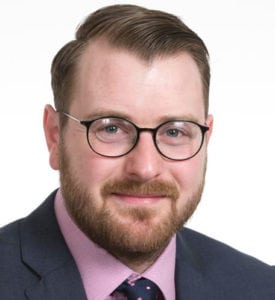What brought you to the patent profession?
It was during my placement year on my MPhys course at the University of Surrey that I became aware of the Intellectual Property profession. At that time I was working in the research department of a large semiconductor telecommunications company and my interest began when the research to which I had contributed was considered as the subject matter for a possible patent application, for a scientific journal or just to be retained as a trade secret. This process involved meetings with a patent attorney, the business development team, and the head of IP at the company, and I quickly came to appreciate how IP affected strategic decisions within the company. However, although I went on to study for a PhD, I came to realise that the lack of work-life balance that academia was likely to afford was not quite for me. I also felt that short-term projects had become more relevant for me as my interests lay across many subject areas, while the academic world tended to focus on a very narrow field. Having identified the patent profession, I attended as many career events where patent attorneys were present and asked as much about the profession as I could. It looked like a combination of what I wanted to do all in one job! In the final six months of my PhD, I successfully secured a trainee patent attorney position at WP Thompson.
What skills are useful in the profession?
The skills I could rely on immediately were: my technical background; the ability to read and digest specialized and highly technical documents; explaining complex ideas clearly and succinctly; and working independently. Under the guidance of the partners and qualified colleagues, who are hugely supportive, I now also have a continually developing skillset for life in the profession.
What training is involved?
The training is predominantly “on the job” and on a personally tailored basis. I love the hands-on approach to the work. From the very first day I was sitting-in on meetings with inventors, contributing to the drafting of patent applications and helping draft responses to EPO examination reports and recently attended my first set of oral proceedings at the EPO. I have also taken part in a half-week course on soft skills including networking, time management and presentation skills. We receive in-house tutorials for the qualifying examinations; and watch numerous relevant CIPA webinars with the rest of the trainees and qualified patent attorneys. Other in-house training covers important aspects such as financial awareness and data privacy. I have also recently completed the course at Queen Mary, University of London which now gives me exemption from the foundation exams for patent and trade mark qualifying examinations.
What are your main duties?
Day to day, I will be drafting responses to search and examination reports, drafting patent applications, reporting and liaising with clients, and assisting with client management activities such as portfolio management and cost-estimate advice. Each day is very different and can involve a wide variety of different technologies which for me currently include telecommunications, robotic mechanisms, seawall defence systems, laser eye surgery devices, and automotive and semiconductor technologies.







